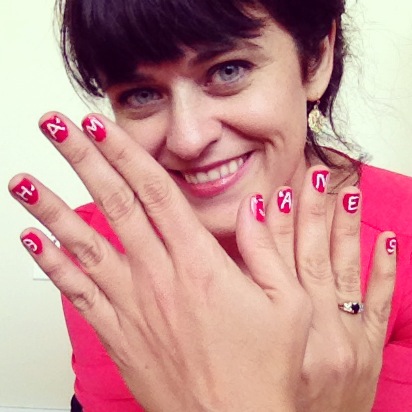
One day I’m going to write a book and when I do I hope I can somehow channel the wit and wisdom of Carrie Rollwagen. Carrie is the author of The Localist, a book about why small shops matter and her quest to only shop from local stores for one year. But you probably already knew that because since Carrie’s book was released in November she has been everywhere! Not only has she had book signings at places like Naked Art Gallery and Little Professor Book Store, but she’s been on radio stations like 100.1 FM and television shows like Talk of Alabama to discuss her book. She did a live chat on AL.com. and even hosted a gift tag and calligraphy bar party around the holidays! But I shouldn’t be surprised that she’s so good at promoting her book. She was just as great at promoting her Kickstarter campaign through which she raised much of the funds needed to self-publish The Localist.
And to think this all started with a blog! Yes, that’s right; Carrie first chronicled her shop small experiment through blogging. Now she’s transformed her blog idea into a book idea and is showing us all how to self-publish and self-promote the right way.

On Tuesday, Jan. 20 at The Nest, Carrie led a talk on self-publishing for about two dozen women as part of the See Jane Write event From Blog to Book with Carrie Rollwagen. During her talk I kept thinking about how, unfortunately, so many self-published authors do the complete opposite of what Carrie was saying, which might explain why so many self-published authors fail at selling their books and building a fan base.
So here’s what NOT to do:
1. Simply copy and paste your blog into a Word file and call it a manuscript. While Carrie’s book was inspired by her blog, she didn’t simply compile her posts and ship them to her printer. “Your blog can act as a focus group,” she said. It will help you determine the topics your fans care about most.
Carrie says she read through her blog and made a list of all the themes of her posts and arranged them into categories and those categories became chapters.
Even though her book is non-fiction, she still wrote her chapters in the form of a narrative. “Story is powerful,” she said.

2. Don’t bother rewriting your work or hiring an editor. Carrie wrote the first draft of her book in only a month. But she spent about a year rewriting it. “Writing is rewriting,” she said. “You need a good editor.” As for choosing the right editor, be sure you pick someone who actually has the time to edit your book and someone with an editing style that works for you. For example, if you want someone who’s not going to simply line edit your work but will ask questions about concepts and composition, find someone who will do just that.
3. Be really, really boring. When marketing your book you must be creative. This means just say no to boring book signings. “Create events that are interesting and newsworthy,” Carrie said. “If you’re doing events there needs to be something more than you just sitting at a table of books.” That’s why Carrie hosted events like a gift tag and calligraphy bar party and a local business holiday fair. Carrie also used her Kickstarter campaign to generate excitement for her book.
4. Be pushy with booksellers. As a self-published author it will be tough to get your book in stores, but it’s not impossible — unless you’re a jerk. Be mindful of the financial risk it takes for an independent bookstore to carry your work and be as easy to work with as possible. One tip Carrie offered was giving a bookseller a free copy of your book to put on shelves. If the book sells most likely the owner of the store will want to sell more and thus work out a distribution deal. Side note: if you don’t want to end up with thousands of copies of your book sitting in your basement, work with a printer who offers a print-on-demand option.

5. Be elusive and mysterious with the press and ignore social media. If you want your book featured in local media make it easy for reporters to cover your events! Send out well-written, informative press releases. On your blog include your author bio, a list of important facts about you and your book, and hi-res images that the media can use.
Also, Carrie said, “Feed the social media beast.” Create a hashtag for your book and use it! Instagram is a good way to get people excited about your brand (yes, as an author you are a brand) and Twitter is great for reaching industry influencers.
Have you self-published a book? What did you learn from your experience?






